In our previous post we looked at how Sweden celebrates Christmas. Today we travel to France…
France Celebrates Christmas: Joyeux Noël
The French phrase les bonnes nouvelles means “the good news” and refers to the gospel. This is where the French get their name for Christmas, Noël. As with many of the European countries, Christmas is one of the most important holidays of the year. France has a unique geographic position working as the liaison between Northern Europe and the Mediterranean. Because of this, the people of France have adopted a variety of Christmas traditions.
French Christmas Music to Set the Mood
The French have been influenced by both American and German seasonal traditions. One of these is the Advent wreath which consists of fir and pine branches that hold 4 pillar candles. These candles are lit on each Sunday leading up to Christmas.
As we have seen from previous countries, the Christmas tree is a cornerstone of Christmas celebrations. French families are no different. France saw its first Christmas tree in Alsace in 1521, which was known as “sapin de noël” or “arbre de noël” The Christmas tree is one of the most popular traditions in France since the 16th century.
Traditionally Christmas trees were decorated with things like apples, ribbons, and paper flowers.
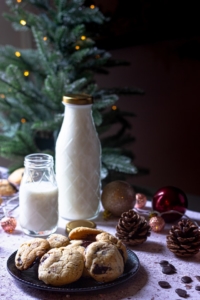 On Christmas Eve, in American traditions, children leave milk and cookies out for Santa. This has been part of the custom for generations. The old French custom was for children to fill their shoes with carrots and treats for Père Noël’s donkey by the fireplace. This tradition evolved into a more American tradition of Père Noël shimmying down the chimney of each home to bring presents for good boys and girls. His donkey has been substituted by 7 magical flying reindeer.
On Christmas Eve, in American traditions, children leave milk and cookies out for Santa. This has been part of the custom for generations. The old French custom was for children to fill their shoes with carrots and treats for Père Noël’s donkey by the fireplace. This tradition evolved into a more American tradition of Père Noël shimmying down the chimney of each home to bring presents for good boys and girls. His donkey has been substituted by 7 magical flying reindeer.
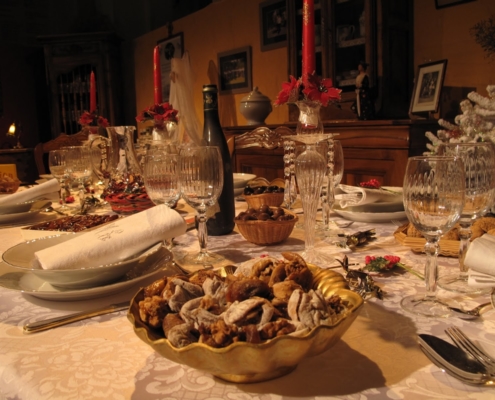 Le Réveillon Feast
Le Réveillon Feast
Often times, children in France open their Christmas gifts on the evening of December 24. They have to wait until Christmas Réveillon dinner or after midnight mass has concluded. Le Réveillon feast usually includes things like a starter of snails, oysters, seafood, or smoked salmon. The main course would most likely be roast goose or turkey. And what French celebration with amazing food could be complete without wine.
Tradition of Gift Giving on Christmas
The symbolic act of gift giving to children on Christmas is meant to symbolize the gifts brought to Jesus by the Three Wise Men on January 6. Traditionally, French children were given a small gift and an orange for Christmas. At the conclusion of the WWII, and the increased American influence on France, the simple tradition evolved into the ceremonial expensive gift giving.
Many French families give thanks to public servants during the Christmas season by giving them money.
Do you know why people hang mistletoe above the doorways at Christmas time? The French would tell you that it is to bring good fortune for the upcoming year… So it is not to steal a kiss from your sweetie… hmmmm.
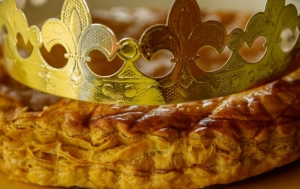 Some French families still follow the old tradition of exchanging gifts on January 6th, the Feast of Kings or Feast of Epiphany. This celebration brings a very exciting twist. The pastry that they enjoy, the gallette des rois (cake of kings), can have something special inside. The person who finds the elusive charm inside is named King or Queen for the duration of the celebration. They even wear a paper crown to symbolize their new found royalty. This also comes with a string attached. The royal winner must then provide the cake for the next party.
Some French families still follow the old tradition of exchanging gifts on January 6th, the Feast of Kings or Feast of Epiphany. This celebration brings a very exciting twist. The pastry that they enjoy, the gallette des rois (cake of kings), can have something special inside. The person who finds the elusive charm inside is named King or Queen for the duration of the celebration. They even wear a paper crown to symbolize their new found royalty. This also comes with a string attached. The royal winner must then provide the cake for the next party.
One of the most recognizable decorations that often grace homes, community gatherings, churches, etc. at Christmas time is the nativity scene. We all know the main characters that are set up for the nativity: Joseph, Mary, Baby Jesus… But the French nativity may have some players that you don’t know about. What about the banker, fruit and vegetable sellers, local noblemen, a blind man, a woman selling fish, a scissor grinder, and a roast chestnut seller? Yes, that’s right… These additions may be found in the French nativity. You would be able to enjoy these nativity scenes all the way to February 2 as this is when they are taken down.
From all of us at Yellowstone Hot Springs, we wish you all a very Merry Christmas and a Happy New Year! Joyeux Noël!

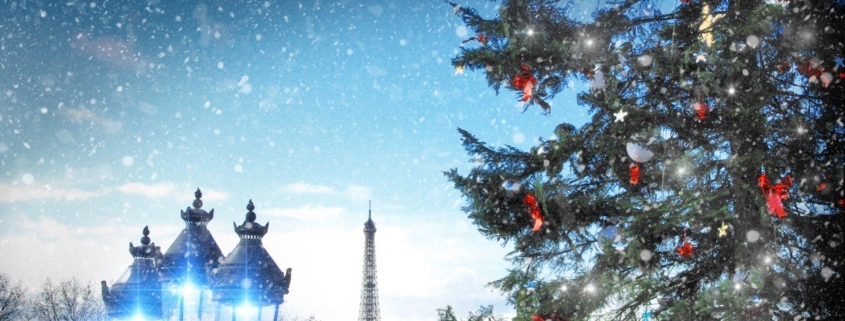
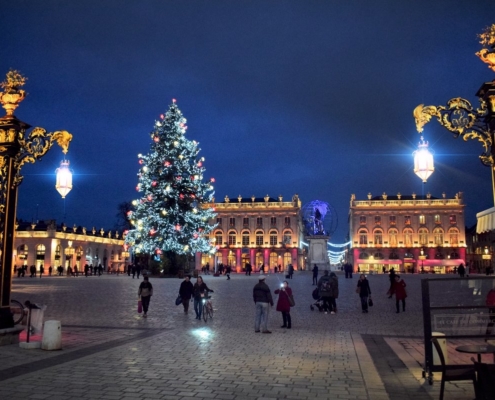



Leave a Reply
Want to join the discussion?Feel free to contribute!